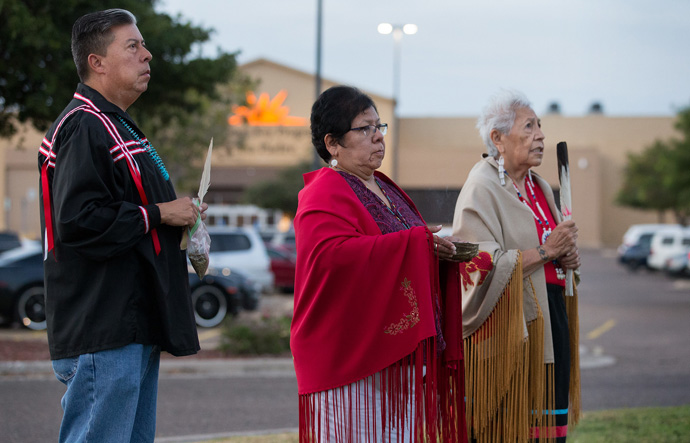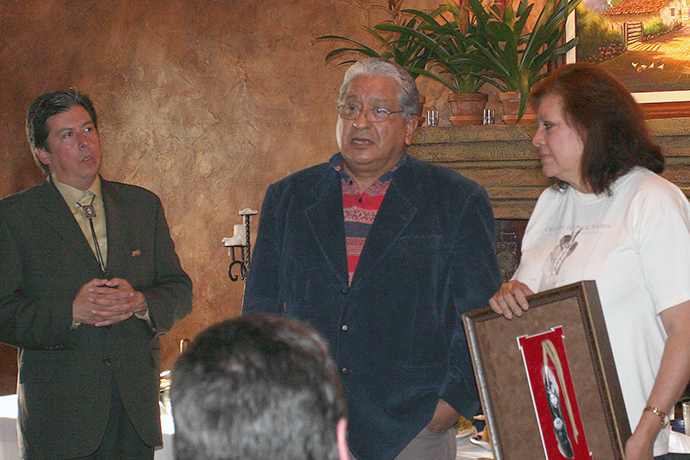Key Points:
- Bishop David Wilson, the first Native American bishop in The United Methodist Church, was elected as an episcopal leader by the South Central Jurisdictional Conference on Nov. 2.
- Wilson, while cognizant of the significance of his election as a Native American, plans to be an effective bishop for all United Methodists under his purview.
- Wilson hopes to make strides engaging with young people as a way to reinvigorate the churches of Kansas and Nebraska.
Is Bishop David Wilson the first Native American bishop of The United Methodist Church? Or would it be better to say he’s a new bishop in the church’s South Central Jurisdiction, who happens to be Native American?
In a word: Yes.
Wilson, a member of the Choctaw Nation of Oklahoma, was elected Nov. 2 alongside Bishops Delores Williamston and Laura Merrill on the first ballot during the jurisdiction’s meeting in Houston. Wilson has been assigned to lead the large Great Plains Conference, which encompasses the entire states of Kansas and Nebraska.
“Well, I think the Great Plains people see me as the bishop and that I happen to be Native American,” Wilson said. “But there are other entities and people who've already called upon me because I'm a Native American … who feel I will give attention to what's happening across the country with Native issues.”
His first few months as a bishop have been about getting moved from Oklahoma City to Topeka, Kansas, making appointments, dealing with disaffiliating churches and redistricting plans and making preparations for the Great Plains Annual Conference June 7-10 in LaVista, Nebraska.
“It’s putting one foot in front of the other,” Wilson said. “Right now, you take care of business in the order in which it comes. … It's been a great experience learning the routine and ropes. The Great Plains includes right now about 900 churches. It’s a huge territory, so it's very difficult at the start to jump in and get to know it all.”
Wilson sat down for an interview with UM News to talk about his priorities and hopes for the future of The United Methodist Church.

Did you grow up as a United Methodist?
My father met my mother when they began attending the Methodist church in Tulsa and then later moved to Muskogee (Oklahoma) and started attending in 1966 or 1967, before it was The United Methodist Church (in 1968).
I grew up in the church active as a layperson. I did everything, like teaching Sunday school when I was 15 years old, leading worship and assisting with Communion. It became a natural part of who I was as a layperson, and I later accepted the call.
I tell people often that my pastor at the time, Lee Chupco, recognized God's call for my life, and I found that my family also recognized that. Of the seven siblings, I was the most active there and church has been a natural part of my life ever since.
What are your priorities around Native American issues?
I'm looking forward to getting to talk about issues around Native people in the Great Plains Conference, like around boarding schools.
We have the Shawnee Indian Mission boarding school (in Fairway, Kansas) at the boundary of the Great Plains. There are eight boarding schools in both states, and two are Methodist. … I anticipate we'll be doing some work around that, especially Sept. 30, which is the National Day of Remembrance for Indian Boarding Schools, when all of this country will recognize its history.
I know we'll do something, at least in one or two places in the Great Plains Conference, to help draw attention to that and the ramifications it has for our future and how we work together.

Also coming is the National Day of Awareness for Missing and Murdered Indigenous Women, Girls and Two-Spirit Peoples, on May 5. Will there be any activity around this in the Great Plains?
There are several chapters devoted to missing indigenous persons in the Great Plains. Wichita, Lawrence and Lincoln are all big areas where there are numbers of women who are Indian and missing.
I'm meeting with our Committee on Native American Ministry in two or three weeks to talk about what they're doing … and also talk to them about the boarding schools.
The other piece, although our numbers are very small in the Great Plains for Native people, just finding ways where they can use their talents and gifts in the annual conference. It's not just with Native issues, but with everything that we do.
How is the disaffiliation process going?
The people in the Great Plains Conference are so ready to move past disaffiliations. There's so much ministry and mission that needs to be done.
This disaffiliation conversation has stifled us to a certain extent, since it's been the top conversation. But the good part about the Great Plains, the trustees and the conference have made this such an amiable process that we have had very little controversy among churches around disaffiliating. … It's been so easy. It's been a fair process. Folks who want to leave are doing that and I think they’re finding it to be a good process.
By April 30, we'll probably lose about 100 out of 900 churches. That’s not a huge percentage, mostly small-membership churches out there that we’ll be losing. Of course, we will miss folks we’ve known for many years. But we want folks who want to leave, to wish them well. They'll continue ministry, just doing it in a different way.
You were in the running to be a bishop two times before being elected. What would you have done had you lost again?
There's always ministry work to be done. I’d go back to doing that, which I did after 2016.
When we were preparing for 2020, people encouraged me to run again. They said they will do everything we can to get you elected. And based on the demographics of our delegates, I realized I had a better chance. There were many folks who promised to help me and they made it happen.
Had the delegation not changed and it had been the same as 2016, I would have said no, I couldn't do it. I was just excited about the possibilities of serving. We had no drama. We were elected on the first ballot, all three (new bishops) on the first day of the conference. So that was exciting to get to have that historic occasion.

Why do people need The United Methodist Church?
I appreciate The United Methodist Church’s work around inclusion, in terms of understanding that this Gospel is for everybody. It’s like we say when we serve communion. “This table is open for everybody. Come and partake.” Also, its emphasis on social justice and how we help the world through the United Methodist Committee on Relief, things we're doing for the community, all sorts of things. Feeding the hungry, caring for the poor, the programs we do around the world, we’re doing this because we’re part of the church. We're doing this because you're a human being and we're called to care for you and help you out.
Does being inclusive include support for gay marriage?
Yes, of course. As indigenous people, we know what it's like to be forgotten and to not be paid attention to. The LGBTQIA communities and folks who don’t think people really care about them or pay attention to them, the church needs to do that. We're not doing a great job of that, but we sure need to.
Four years from now, what do you want to have accomplished?
Part of my job is helping to find ways for lay people to be able to play into what God has given them to be effective ambassadors for Christ. And in communities that are growing, for us to grow. … How do we prepare the church for our young folk? There are some great ideas, good things happening.
People always say, “We want young people in church.” But they want you to act like they do. They want you to act like a 40- or 50-year-old rather than letting young people be who they are. We have so much to learn from the young. … It’s always fascinating to see these studies and see what interests young people. Not to entertain them, but how do we engage a true spirituality?
Patterson is a UM News reporter in Nashville, Tennessee. Contact him at 615-742-5470 or [email protected]. To read more United Methodist news, subscribe to the free Daily or Weekly Digests.




